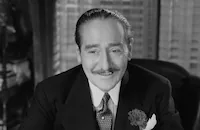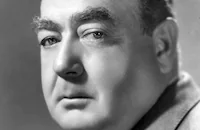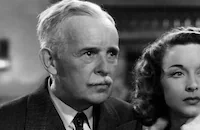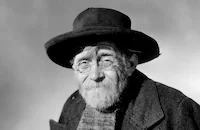One Hundred Men and a Girl
Brief Synopsis
Cast & Crew
Henry Koster
Deanna Durbin
Adolphe Menjou
Alice Brady
Eugene Pallette
Mischa Auer
Film Details
Technical Specs

Synopsis
Unemployed trombone player John Cardwell begs conductor Leopold Stokowski for a job, but his manager throws him out into the street, where he finds a lady's purse. When he attempts to return the purse, the doorman slams the door in his face, and so he returns to his apartment, using the money in the purse to pay his rent. John tells his daughter, Patsy, he did get a job with the orchestra, but when she finds out he was lying, insists on returning the purse herself to socialite Mrs. Frost, after finding her address in the purse. Mrs. Frost is delighted with Patsy, who makes an impassioned speech to her wealthy guests about all the out-of-work musicians in town. On a suggestion from a guest, Patsy decides to form her own orchestra, and Mrs. Frost blithely agrees to be the financial backer. Patsy's father and friends form a one-hundred man orchestra and begin rehearsals in a garage, but when Patsy discovers Mrs. Frost has left for Europe and forgotten her promise, she calls on her husband, John R. Frost, who thinks the whole thing is a practical joke until John punches him for leading them on. Refusing to give up, Patsy hides in Stokowski's office in the auditorium where he rehearses, and when a newspaper editor telephones, she tells him that Stokowski will be conducting an orchestra of unemployed men sponsored by Frost. After Patsy sneaks into the auditorium and sings with the orchestra, Stokowski takes her more seriously, but refuses to conduct her orchestra to give it legitimacy. Patsy becomes disillusioned until the newspaper prints the story she gave the editor and Frost realizes the orchestra is a great publicity stunt for his company. To convince Stokowski to conduct for them, Patsy sneaks the entire orchestra into his house to play for him. He is so moved by their performance, that he cancels a European trip to conduct the orchestra, after which Patsy is called on stage to sing.

Director

Henry Koster
Cast

Deanna Durbin

Adolphe Menjou

Alice Brady

Eugene Pallette

Mischa Auer

Billy Gilbert
Alma Kruger
Jack Smart
Jed Prouty
Jameson Thomas

Howard Hickman
Frank Jenks

Christian Rub
Gerald Oliver Smith
Jack Mulhall
Leopold Stokowski
Crew
Hector Berlioz
Bernard B. Brown
Bernard W. Burton
Sam Coslow
John P. Fulton
John Harkrider
Ferdinand Herold
Frederick Hollander
Charles Kenyon
Joseph R. Lapis
Franz Liszt
Scollard Maas
Bruce Manning
Anne Honoré Joseph Mélesville
James Mulhauser
Harold Palmer
Joe Pasternak
Francesco Maria Piave
Charles Previn
Thomas T. Railey
Alfred G. Robyn
Charles R. Rogers
Andres De Segurola
Frank Shaw
Jack Martin Smith
Leopold Stokowski
Peter Ilyich Tchaikovsky
Joseph Valentine
Giuseppe Verdi
Richard Wagner
Vera West

Film Details
Technical Specs

Award Wins
Best Score
Award Nominations
Best Editing
Best Picture
Best Sound
Best Sound Editing
Best Writing, Screenplay
Articles
One Hundred Men and a Girl
Durbin had first come to the attention of producer Joe Pasternak when he and his partner, director Henry Koster (known in his personal life as "Bobby"), were looking for an actress for their first Universal film, Three Smart Girls (1936). Pasternak later wrote in his autobiography, "We needed a twelve year old girl with the indefinable charm of the girl who was once rightly called America's sweetheart." That search proved unsuccessful until Pasternak spoke with casting director Rufus Le Maire, who had just come to Universal from MGM. "Rufus grinned, ‘I think I know just where to find such a girl. In fact, you can have your choice of two.' 'Choice?' My voice cracked. Here I was asking for another Mary Pickford and this man says there are more than one. 'Over at Metro they've got two kids under contract. They both have tremendous possibilities, I think. I'll get the film and run it for you. I'm pretty sure they're dropping one of them.'"
"I could hardly wait until the next day when the film arrived. Everything Rufus said was right. The girl was warm, lovable, natural, charming. She sang in a way to win your heart. 'That's the girl,' I shouted when the light went up in the projection room. 'What do you say, Bobby?' Bobby agreed. We turned, beaming huge smiles at Rufus. He kept swallowing, staring at us, unable to make a word come out of his mouth. 'What's the matter, Rufus?' I said. 'Don't you understand? We like her, she's terrific. You can sign her.' A thin stream of words finally came out of Rufus. 'Remember I told you they had two girls and were dropping one? This is the one they decided to keep.'"
MGM's choice was Judy Garland.
Le Maire asked to run the second girl's test, telling an unenthusiastic Pasternak, "You're here - you might as well look." Pasternak remembered, "This was a singing test, but the moment the girl's face was flashed on the screen Bobby and I sat up. Bobby was sitting in the seat immediately behind me. He didn't say a word, just leaned forward and put his hand on my shoulder. The girl had a sweetness without being arch or cloying; she was natural; she was pretty; she was wholesome; and she sang beautifully with a skill and ability far beyond her years." The girl was Deanna Durbin and she got the part.
Three Smart Girls was a respectable hit for Universal; and the team of Pasternak and Koster - who had been treated like amateurs by the studio - was given the opportunity to make a second picture. Because their first success might be considered a fluke by Universal, Pasternak and Koster needed another hit. "We would stand or fall, we realized, on our second. One Hundred Men and a Girl (1937) was the story of the enterprising girl whose father is an unemployed musician. The story itself can only be understood in terms of the mid-Thirties when this country was still suffering the effects of the depression and solvent symphony organizations were few and very far between." Universal had serious objections to the story. "We shouldn't tell stories about the unemployed; it was too close to home. And, above all, what's this with a symphony orchestra? Long-hair music? Did we realize this was box office murder? We stuck by our guns and got approval to make the story we wanted. Then the problem was to persuade [famed conductor Leopold] Stokowski. It was not going to be easy, we were told. In the first place, maybe he wouldn't want to "demean himself"; the highbrow critics always wrote about film music the way the drama critics had once treated the infant motion picture, as less than the dust beneath a true artist's chariot wheels. That Stokowski himself would be difficult we were warned."
By the 1930s, Leopold Stokowski had turned the Philadelphia Symphony Orchestra into what no less a critic than Sergei Rachmaninoff called the greatest in the world. Stokowski himself was something of an icon - his trademark long white hair and regal bearing would be imitated by many - perhaps most famously by Bugs Bunny in the Warner Brothers cartoon Long-Haired Hare (1949), in which Bugs, dressed as Stokowski strides towards the conductor's podium at the Hollywood Bowl, accompanied by awed whispers of "Leopold!" Little wonder that Pasternak was worried. After all, as he himself wrote, "It must be remembered that up to this time, with some minor exceptions, symphonic conductors had not figured or played in popular motion pictures."
"I called on Stokowski in a Hollywood apartment he was inhabiting at the time. I was surprised to find him the warmest of men, forbidding when he chose to be, but, as his manager had indicated, a daring man, never satisfied with yesterday's achievement. I told him about all the opposition I had run into in wanting to make a picture involving a whole symphony orchestra. This intrigued him. The orchestra is a living, breathing thing to Stoki, and the idea of projecting it in dramatic terms was not unattractive to him, I could see that. Still, he wasn't easy to persuade. He didn't wear his musical heart on his sleeve. 'What kind of music would you want?'
"I stumbled and fumbled and cleared my throat. I wanted to disabuse him of any notion he might have that we would employ a Wagnerian Rhine-nymph sheathed in a ton of armour plate to whoop and holler for fifteen minutes. 'I don't know, that is, I hope, or rather, maybe you have,' I stumbled, 'or should have, seen a picture I did called Three Smart Girls.' 'Oh, did you do that? I loved it. Those charming, sweet girls!'"
Stokowski asked Pasternak why he wanted to make a film with classical music. Pasternak replied, "I used to get annoyed by my European friends. To them America is the installment plan, canned soup, and used car lots. They always act surprised to learn that millions of Americans liked good paintings, good music and good dancing. They think that because everything is big here it can't be very good. I want to prove that the American people also appreciate quality of the highest sort." "I'll do it," Stoki said when he heard that.
Despite Universal's initial skepticism, the story of an unemployed musician's daughter who mistakenly thinks her father has secured a job with Leopold Stokowski; and the unlikely combination of Durbin and Stokowski turned out to be a huge hit not only with the public but also with the notoriously hard-boiled film critics. P. Galway in The New York Statesman wrote "Useless to pretend that I am tough enough to resist the blandishments of Miss Deanna Durbin. The candid eyes, the parted lips, the electric energy, the astonishing voice; if they bowl over 50 million or so, surely a critic may be pardoned for wobbling a little on his professional base. For this is pure fairy tale; but it comes off." The Academy of Motion Picture Arts and Sciences were equally charmed. One Hundred Men and a Girl was nominated for five Oscars®, including Best Picture, Best Film Editing, Best Sound Recording, Best Writing. It won Best Music Score for department head Charles Previn. Although Deanna Durbin went on to make many other films until her retirement from the screen in the late 1940s, this is arguably the film for which she is best remembered.
Producer: Joe Pasternak, Charles R. Rogers
Director: Henry Koster
Screenplay: Charles Kenyon, Hanns Kraly, Bruce Manning, James Mulhauser
Cinematography: Joseph A. Valentine
Film Editing: Bernard W. Burton
Art Direction: John W. Harkrider
Music: Sam Coslow, Frederick Hollander, Charles Previn, Frank Skinner
Cast: Deanna Durbin (Patricia Cardwell), Leopold Stokowski (Himself), Adolphe Menjou (John Cardwell), Alice Brady (Mrs. Frost), Eugene Pallette (John Frost), Mischa Auer (Michael Borodoff).
BW-85m.
by Lorraine Lobianco

One Hundred Men and a Girl
Quotes
Trivia
Notes
Some contemporary sources list the film's title as 100 Men and a Girl. The end of the opening cast credits read: "...with Leopold Stokowski conducting music from..." Thus, his name is separate from the other cast credits. At the time this film was made, Stokowski was the conductor of the Philadelphia Symphony, and had appeared in one other film, The Big Broadcast of 1937. Film Daily reports that Jed Prouty was borrowed from Twentieth Century-Fox for this film. According to a news item in Hollywood Reporter, the film had its premiere at the Pantages theatre in Hollywood, with a ticket price of two dollars. According to the pressbook, the set for the auditorium was rebuilt from the set used in Phantom of the Opera, and Stokowski's New York home is seen in the film. The pressbook and various reviews noted the use of multiple channels and sound tracks in recording the orchestra in the film, a technique that Motion Picture Herald said "...may turn out to be one of the precedential aspects of this production." The reported number of microphones used varies from twelve, fourteen and twenty-eight. The procedure was arranged at the Academy of Music in Philadelphia, PA, and RCA recorders were used. One Hundred Men and a Girl was nominated for the 1937 Academy Awards for Best Picture; Film Editing (Bernard W. Burton); Sound Recording (Universal Studio Sound Dept., Homer Tasker, sound dir); and Original Story (Hans Kraly). The film won the Academy Award for Musical Score.

Miscellaneous Notes
Released in United States 1937
Released in United States on Video January 17, 1995
Released in United States 1937
Released in United States on Video January 17, 1995













